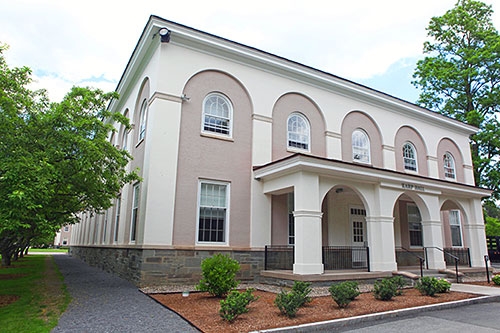The English faculty is very proud of what its majors have achieved after graduation from Union. Some have received prestigious awards, including Watson and Fulbright scholarships, and graduate fellowships from Washington University and Rutgers. Some of our graduates went on to attend law school at Cornell, Harvard, and George Washington. Others still have studied creative writing and journalism at Columbia, NYU, Northwestern, Johns Hopkins, and Washington University, or completed degrees in business at the University of Pennsylvania and Stanford. Some have gone to medical school. Others are working for the U.S. Information Agency, or are in the Foreign Service, and a number are working for TV or radio stations, or in business, sales, advertising, management, publishing, or editing. But whatever their specific professional objectives, all graduates have profited from the faculty’s commitment to rigorous critical analysis, clear thought and speech, and precise, graceful writing–the cornerstones, we feel, of a genuine humanistic education.
An English major is not a preprofessional program in the narrow sense (that is, a vocational course of study leading to a single profession), but it does prepare one for a life that is profitable, in all those forms of work in which analytical skills, judgment, and the capacity to write with accuracy and speak with power are valued. In fact, skills of this kind are especially resistant to the effects of economic change: they fit one to hold not one but many posts with credit, and thus to adapt to many situations.
Students interested in creative writing at Union have the opportunity to take a range of writing courses at the introductory and advanced level. We offer workshops in poetry, fiction, non-fiction, and screen writing from experienced and well-published faculty members. The department has a commitment to writing that extends beyond our creative writing offerings. Our literature courses provide the student with a chance to study a wide and diverse selection of authors from early English literature to contemporary fiction and poetry with faculty whose interests include Ethnic American Literature, African-American Literature, the Beats, the Digital Humanities, film, Jewish Women Writers, and the graphic novel, as well as the traditionally valued authors of the English, Irish, and American traditions. Students in these classes have the opportunity to develop their critical and sometimes their creative writing. The department is particularly proud that both our faculty and students have published in a variety of contexts and genres, from articles and books from scholarly presses, to poems, stories, novels, and essays in print and online. Qualified seniors may pursue a creative project in their work towards departmental honors. Our students have found internships or employment in journalistic venues including The Nation, Cosmopolitan, and The Huffington Post. We also host readings by visiting writers. Recent visitors have included Andre Dubus III, Paula Meehan, and Anne Enright, as well as alumnae writers, Andrea Barrett, Nicki Beland, and Annemarie Monahan. Applicants are also welcome to contact Prof. Jordan Smith for more information.
Here is what some of our undergraduate English majors and minors have been doing since graduation from our department at Union College:
Ceillie Clark-Keane, ’13. English & Classics Double Major. M.A. Program in English, Northeastern University.
Molly Congdon, ’12. English Major. Program in Magazine Journalism, New York University.
Daniel Kason, ’11. English Major. Ph.D. Program in English, University of Maryland, College Park.
Michael Montesano, ’09. English Major. Ph.D. Program in Comparative Literature (Specialization in Africana Studies), Indiana University Bloomington.
Sarah O’Connor, ’11. English & Psychology Double Major. Ph.D. Program in American and New England Studies, Boston University.
Erin Schumaker, ’09. Spanish & English Double Major. Medill School of Journalism, Northwestern University.
Alumni who wish to be in touch: please contact Professor and Chair Kara Doyle
